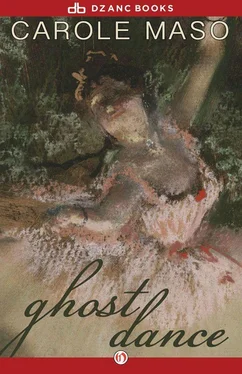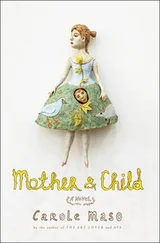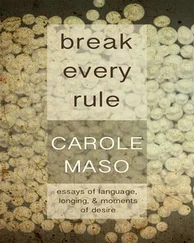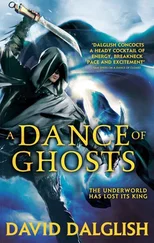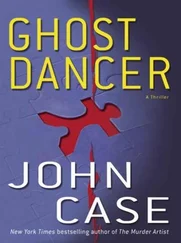Carole Maso - Ghost Dance
Здесь есть возможность читать онлайн «Carole Maso - Ghost Dance» весь текст электронной книги совершенно бесплатно (целиком полную версию без сокращений). В некоторых случаях можно слушать аудио, скачать через торрент в формате fb2 и присутствует краткое содержание. Год выпуска: 2013, ISBN: 2013, Издательство: Dzanc Books, Жанр: Современная проза, на английском языке. Описание произведения, (предисловие) а так же отзывы посетителей доступны на портале библиотеки ЛибКат.
- Название:Ghost Dance
- Автор:
- Издательство:Dzanc Books
- Жанр:
- Год:2013
- ISBN:9781480441897
- Рейтинг книги:5 / 5. Голосов: 1
-
Избранное:Добавить в избранное
- Отзывы:
-
Ваша оценка:
- 100
- 1
- 2
- 3
- 4
- 5
Ghost Dance: краткое содержание, описание и аннотация
Предлагаем к чтению аннотацию, описание, краткое содержание или предисловие (зависит от того, что написал сам автор книги «Ghost Dance»). Если вы не нашли необходимую информацию о книге — напишите в комментариях, мы постараемся отыскать её.
has to offer. Like her artist-protagonists, Maso's subject as well as medium is language, and she is brave and dangerous in her command of it. She abandons traditional narrative forms in favor of a shaped communication resembling Beckett and rivalling his evocative skill. Immersed in dilated and intense prose, the readers view is a privilege one, riding the crest of clear expression as it navigates the tangled terrain of loss and desperate sorrow.
Ghost Dance — читать онлайн бесплатно полную книгу (весь текст) целиком
Ниже представлен текст книги, разбитый по страницам. Система сохранения места последней прочитанной страницы, позволяет с удобством читать онлайн бесплатно книгу «Ghost Dance», без необходимости каждый раз заново искать на чём Вы остановились. Поставьте закладку, и сможете в любой момент перейти на страницу, на которой закончили чтение.
Интервал:
Закладка:
For one month each year my mother and my grandmother would become friends. They sat side by side, putting cloves in oranges, hanging boughs of pine, discussing the Christmas Eve dinner. Each December my mother tried to assume some of those practical, worldly mannerisms. There they sat, the two of them, contented, shoulder to shoulder in our kitchen one week before Christmas — my grandmother laughing with the woman who had ruined her son’s life, and my mother festive, manic, in a flowered apron, asking my father, of all things, to be sensible. Journeying in opposite ways around the world, each year they met for a month on some magic, neutral ground where they embraced and forgave. My mother must have missed her own mother very much; she clung so tightly to my grandmother’s rigid life.
There were other miracles: the dark house transformed magically into a house of happiness and light, a place where gingerbread men walked from the warm oven in happy rows, a house that rang with laughter and music and bells, a house where a perpetual fire burned, giving a dramatic warmth, the smell of pine flooding the whole living room.
The star that rose up in my mother at Christmas seemed to hang over our house, protecting us. We were all happy, I am sure of it, even Father. He would sit for hours at the piano and play the songs of the season, asking for requests.
“We Three Kings,” Fletcher shouted from another room.
“Un Flambeau, Jeannette, Isabelle,” my mother cried.
“Oh, please play ‘White Christmas,’” I would sigh. I would sit on the piano bench next to him and turn the pages when he nodded. Often he would slow it the hard parts to ensure he touched the right notes. His touch was tentative, is in life. I watched his hand as he reached his long finger up to a black key where it lingered for a moment and then pulled back. For hours I would sit lext to him, watching him, listening to his halting Yuletide songs.
“We’re quite a team, you and I,” he would smile when he was finally done, touching my back lightly, applying just the slightest pressure. He looked into he other room, lost in some melancholy melody—“Away in a Manger” or “Silent Night.” I could feel the snowy bones of his hand still on my back even is I was losing him. I looked into his eyes, those remote, cold fields. I studied them hard as I tried to comprehend the mystery of love, for, as we sat there on he piano bench — my father, far, far off and then back, then far off again, then returning to discuss his ideas for a hot punch with port — I loved him fiercely, inreasonably.
“Come on,” cried Fletcher, “it’s almost done.”
Even as a little boy Fletcher liked to assemble the crèche. In the early years Grandpa had assisted him. First they put together the barn, then carefully unwrapped each Hummel from its tissue paper. They had been bought by my mother’s friends Florence and Bethany, one by one each year, and given to Fletcher and me as Christmas presents. It was only last Christmas, with the youngest shepherd taking his place far left, that the scene completed itself.
“The wise men,” my grandfather said, his eyes shining. “These, children, are the wise men.” We stared at the kings, purple robed, dark skinned, holding wisdom in their eyes and gifts for the baby in their hands. I looked at the baby, just a regular baby really, then back to the wise men, then to the baby again, then up to Mary. Her bowing head, her glowing face seemed happy and sad at the same time. Her open hands were shaped like hearts. I turned to Joseph. My eye lingered longest on Joseph usually, standing off to one side. I studied every wrinkle in his rough robe, touched his face. He was so lonely, I thought, so separate from the rest — lonely as faith itself. I touched his sandaled feet with my thumb. He faltered. His pain was unspoken, difficult to name, his carpenter’s hand raised in front of him as if he could not view this scene, could not view his wife and child except in this way. He never moved. I have thought of him many times throughout the year in that large box in the basement labeled “crèche.” Wrapped in tissue paper, his one hand raised, slightly open, he looks through his fingers in awe.
Fletcher put the young shepherd next to the elderly man who bends over with balding head, and the scene was complete. We looked at the assemblage quietly, knowing already the rest of the story: the afternoon of agony still to come, the betrayal, the rising up on the third day.
I would like to believe that Fletcher carries inside him now into the center of the country the whole of this scene. But it is only Joseph’s uncertain position, somewhere between hope and despair, belief and disbelief that I have been able to keep.
There were times when I had gone off with Grandma, that skeptic, to Mass, where weekly I could witness miracles, babble in Latin, denounce Satan, chant to the dead. Blood flowed down those aisles. God was a white bird called the Holy Ghost and a baby and a man and a father, all at the same time. Trees sang. Bushes burned. There was a living water, an eternal fountain inside us that we thirsted for. There were Barnabus and Ignatius, Perpetua and Agnes, Anastasia. I grew dizzy in the sound of it all: the strange songs, the bells, the incense, the wailing for forgiveness, the cross, the apostles and all the martyrs, the saints, Felicity and Cecilia, the blood no doors could hold back.
But slowly, as I sat there with my doubting grandmother beside me, the church changed: the bells became faint and then were gone. We did not beat our breasts, we did not chant ourselves, in another language, into knowledge. Things were explained, reduced. Some of the saints were demoted. The huge pipe organ became a guitar. The words relevant and rational were murmured like prayers. And the Holy Ghost became the Holy Spirit because it was supposed to be less scary.
Leave them alone, the rivers of blood, the bread from the sky, the wine at the wedding, the saints. Leave Him, the man on the cross dying for love. The church puts words in His sweet mouth, simple feelings in His complex heart. I will not listen; its English is as flat as unrisen bread.
Leave Him alone, the man on the cross dying for love. The church has Him turn his face away from Natalie. The church has Him disown Marta. The church makes Him say He cannot love Florence or Bethany; he cannot love Sabine — ever.
In Italy, Florence and Bethany say there are steep steps that seem to go to heaven itself, leading up to an altar that you must climb up on your knees in devotion. I don’t know for sure, but I have a feeling you can walk up those steps now on your feet.
Each Christmas Florence and Bethany told me stories as we grated the various cheeses for the soup or for the brussels sprouts or whatever it was that year. Invariably I would get my fingers caught in the sharp grids of the metal grater, my flesh becoming more and more mangled and bloodied as I continued my task. What was I trying to feel? Whom was I punishing?
Just last year Bethany held my shredded hand under water and shook her head. She talked to me softly as she wrapped my hand up, then hugged me to her as if I were a child. How fond I am of them, my mother’s friends, Florence and Bethany, companions for life, generous and kind, unchanging year after year, not even aging, it seems. How I miss them now — those gentle, large-hearted women, those solid citizens, satisfied, intelligent, calm, like no one I have ever known. I cannot remember a Christmas without them — flown in from Italy or Spain or Greece, wherever they had spent the year before, with gemlike stories from an exotic world and news of Sabine.
They blend together finally, each Christmas one spirit, one great sensual procession of friends and family. My grandmother and grandfather sit at one end of the large lacy table. My brother is next to my grandfather, then my aunt, my uncle. My cousin Denise, an insurance salesman like her father, raises a glass of white wine to her lips. Florence brushes the hair from Bethany’s forehead. My Aunt Lucy sings for the turkey stuffing in her bird voice, smiling her mischievous smile, so happy. Sing on, Aunt Lucy. Sing now, louder than you ever have. Continue to believe in the life of the family. We need your faith, the faith that turned you from a girl into a nurse as you worked night after night to save your mother’s lost life. We need your faith now, your pressed white faith, your bedpan faith, your practical love.
Читать дальшеИнтервал:
Закладка:
Похожие книги на «Ghost Dance»
Представляем Вашему вниманию похожие книги на «Ghost Dance» списком для выбора. Мы отобрали схожую по названию и смыслу литературу в надежде предоставить читателям больше вариантов отыскать новые, интересные, ещё непрочитанные произведения.
Обсуждение, отзывы о книге «Ghost Dance» и просто собственные мнения читателей. Оставьте ваши комментарии, напишите, что Вы думаете о произведении, его смысле или главных героях. Укажите что конкретно понравилось, а что нет, и почему Вы так считаете.
